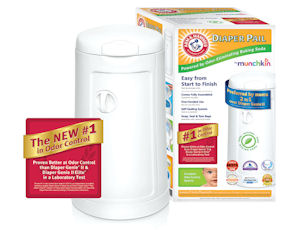A Los Angeles federal jury recently awarded nearly $13.5 million to diaper pail maker Munchkin Inc. of North Hills, finding that advertising claims made by rival Playtex Products LLC didn’t pass the smell test. Munchkin prevailed on July 20 by arguing that Playtex had deceived consumers by falsely saying its Diaper Genie Elite diaper pail was “Proven no. 1 in Odor Control” and was “no. 1 Recommended Among 1st Time Moms.” The jury also sided with Munchkin against Playtex’s counterclaims, finding that Munchkin’s evidence supported advertising claims that a laboratory test had shown its diaper pail was better at controlling odor than Diaper Genie II and Diaper Genie II Elite, both made by Playtex, and that a study of 100 mothers found the Munchkin pail was preferred 2-to-1 over the Diaper Genie II. “Playtex deliberately and continuously deceived consumers by making false and misleading claims about the superiority of its products,” said Petty Rader, Munchkin’s in-house counsel, who tried the case with R. Cameron Garrison, David Barnard, and Travis McCallon, partners from Lathrop & Gage’s intellectual property practice. Playtex was unavailable for comment. Munchkin CEO Steve Dunn said the two-week trial carried extremely high stakes for the company’s adversary, which has long dominated the diaper pail industry. “Playtex has had an 85- to 95-percent market share for the last 10 years,” he said. That may have accounted for the case not settling before trial, as do the vast majority of product claim disputes. Odor control is extremely influential in a consumer’s decision about diaper pails, said Dunn, adding that an advertising message “doesn’t get erased or reduced by a verdict. A long period of false advertising can become a long period of moms recommending a less effective pail.” For that reason, he said, the substantial jury award to Munchkin will be needed to fund a “remedial advertising” campaign to counteract the false image created by Playtex. “Playtex claimed for six years straight that their product was number one in odor control,” said Dunn. “A lot of consumer product companies are left unchallenged for a long time. They don’t often go up against a smaller company like us.” Smell tests Few companies are able to take the financial risk involved in mounting a legal challenge against an industry powerhouse such as Playtex, which is a wholly-owned subsidiary of Energizer Holdings, Inc. Founded in 1991, Munchkin is a privately held international company that makes a range of infant and toddler products. “I spent four to five years developing our pail, and we have 22 patents issued or pending on it,” said Dunn, referring to the ARM & HAMMER Diaper Pail by Munchkin, which utilizes ARM & HAMMER baking soda for odor control. “I couldn’t sit by and let (Playtex) claim to be number one.” Under federal law, product claims such as “best” or “number one” must be proven by testing. The Munchin/Playtex case turned in part on testing methodologies used to support the claims. Two key prongs of odor testing of diaper pails involve inserting dirty diapers into the pail and then dumping the contents to determine whether detectable offensive odors escape at either step, said Dunn. Munchin tests its products by filling and emptying the pails, and then scientifically determining resultant odor levels through laboratory testing. Playtex conceded in the court case that its pails had not been dumped during testing and said it had relied instead on “simulated testing.” The simulations were performed by a panel of trained human “sniffers,” who were directed to an area containing diaper pails and asked to report whether they detected an offensive odor. Dunn – and apparently the jury – found the method unreliable. Calling simulated testing “nonsense,” he said, “If anyone in my company did simulated testing, he wouldn’t be working for me anymore. Simulated tests are not appropriate at any time. That’s why scientific testing was developed — it’s objective. Sniffers are subjective; everyone ‘smells’ differently.” Dunn compared Playtex’s methods to saying that a police officer sniffing a driver’s breath is as reliable as using a breathalyzer device to determine blood alcohol level. When trying to detect the odor of ammonia, which is present in urine and thus is often used in diaper pail testing, “the human nose is not as precise a detector . . . as an ammonia analyzer (device) is,” said Albert Heber, an odor and trace contamination testing expert and a professor of agriculture and biological engineering at Purdue University, in an interview. Heber reviewed all the tests conducted by both Munchkin and Playtex in the case and testified at trial. Heber said sensory testing can be valid in certain cases but said he prefers to use it in conjunction with “analytical” (scientific) methods because each has its own benefits and disadvantages. He said he found it “totally incredible” that Playtex did not conduct its own testing to replicate Munchkin’s ammonia testing, noting that it would have cost the company only about $2,500. The size of the $13.5 million damage award to Munchkin in the United States District Court for the Central District of California in Los Angeles appears in line with a 2009 jury award in a federal lawsuit in Virginia that also was based upon false advertising claims about baby products. In that case, PBM Products LLC, which supplies store-brand infant formulas to Walmart, Sam’s Club, Target, Kroger, Walgreens and other retailers, received a $13.5 million jury award against Mead Johnson & Co., the operating subsidiary of Mead Johnson Nutrition Company. The jury award to Munchkin remains subject to post-trial motions and entry of a final judgment, as well as a subsequent appeal, which is likely in such cases.
